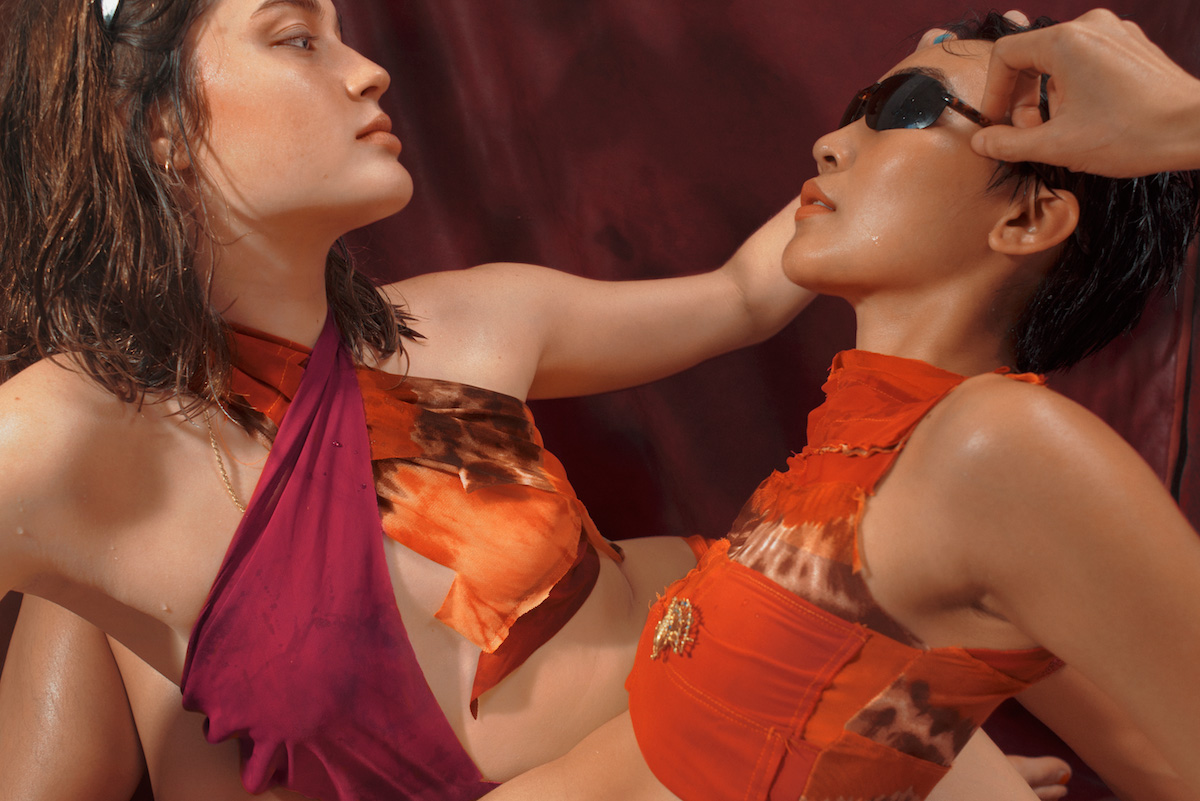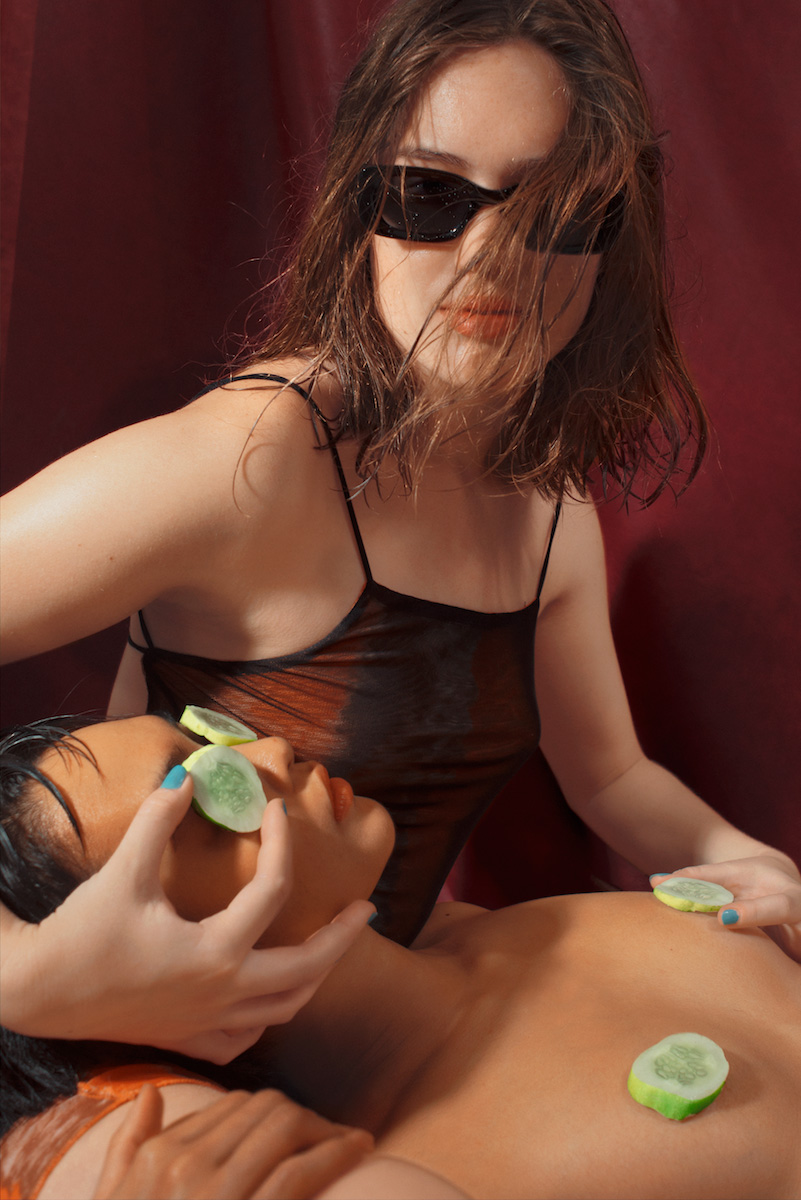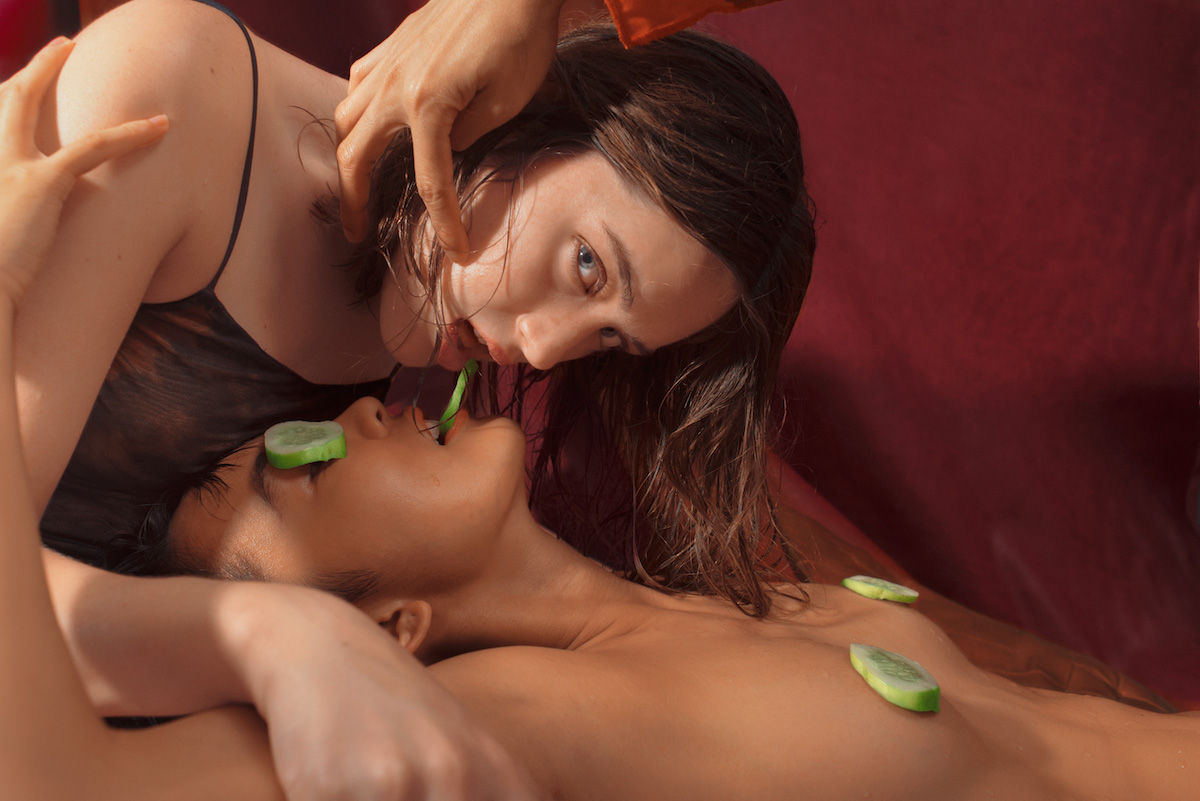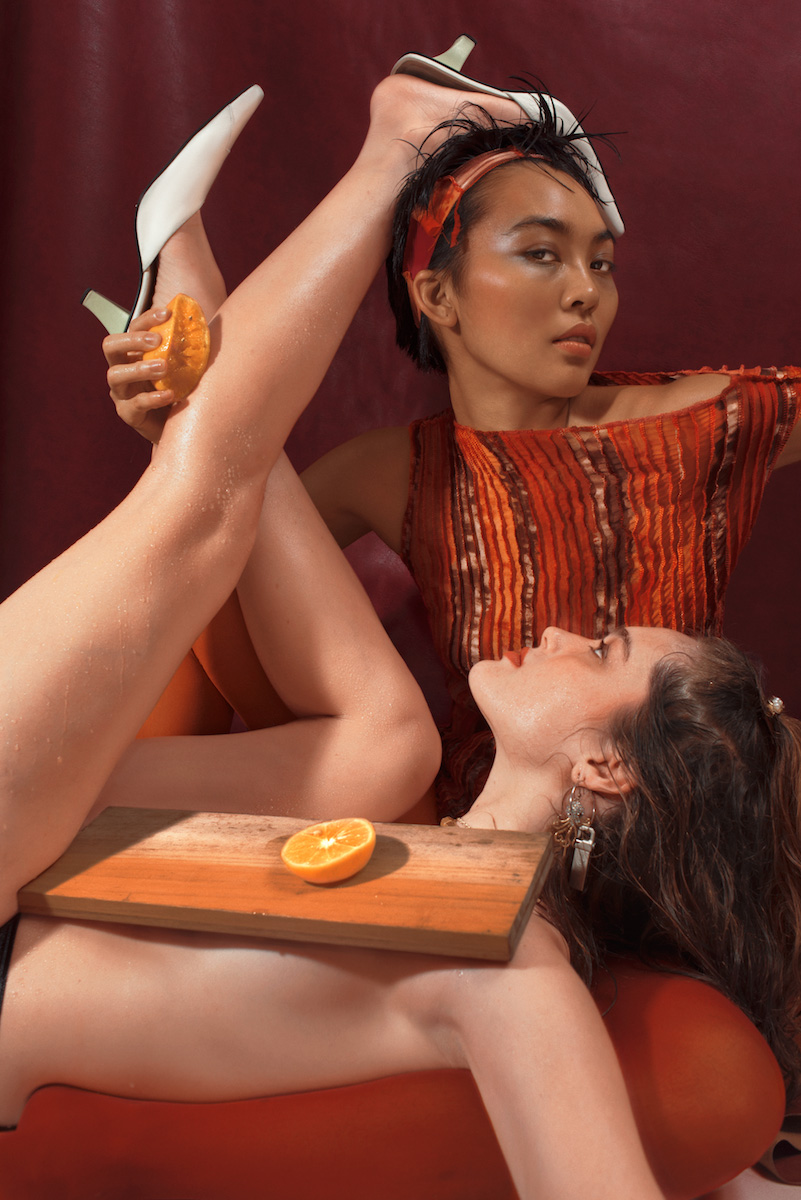The Manila-based duo creating sustainable style for island gals.

Amongst glittering seas, powdery sands and tessellating palm shadows lie self-proclaimed island girls Aiala Rickard and Isabel Sicat. They are the “wife-style” duet in charge of TOQA, a Philippines-based fashion label buffing up the nation’s fashion surfboard. Rickard and Sicat first met as classmates studying apparel design at Rhode Island School of Design, finding solace in each other as “two girls from the tropics [bonded by their] inability to understand winter jackets and affinity for waltzing around the studio in our panties”.
Together they created an aesthetic, “sport resort”, to spread the island-girl gospel in the form of tie-dye trapeze jumpsuits, corrugated stitched bags and deconstructed skirts and trousers in kitschy tropical prints. They’ve been smart as a business, using a locally sourced supply chain, buying bolts of deadstock fabric, maintaining a zero-waste policy, collaborating with WWF and even dying fabrics with Tang. It’s refreshing to find clothes that aren’t dull, simple or mundane that are leaving a bigger footprint in style than carbon. We suspect the TOQA season is only just beginning…
You met each other at RISD, who initiated contact? And how did you find out you were meant to be?
We had always been adjacent to each other at RISD, classmates in apparel design. But our first real conversation happened when Isabel broke up with a college boyfriend, and Aiala came to her rescue. We found solace in each other, a familiar comfort between two girls from the tropics whose inability to understand winter jackets and affinity for waltzing around the studio in our panty often made for hilarious snapchat stories.
We were inseparable. We had so much fun together that to do anything else seemed ludicrous. Nobody was representing the contemporary island girl in an honest manner: all imagery was stereotypical, flattening, lacking in any sort of critical discourse. And we had such a deep respect for each others’ work and sensibilities that when we combined them, we found we were much more powerful than when we were apart. Together, we created an aesthetic which spoke to both of our island experiences: SPORT RESORT. It only made sense for us to go forth and spread the island girl gospel.
Can you describe your working process? Who does what in the TOQA universe?
We are two sides of the same coin. We have to work separately before merging into one coherent vision. The strength of our collaboration comes precisely from that: we have entirely different methodologies, but they ultimately complement each other. Imagine two opposite points on a spectrum—we work inward, toward the moment when they meet in the middle. It is only when both of us are ecstatic (literally screaming in excitement) that we know we have arrived.
You call yourself island girls. What makes an island girl and who gets to be one?
An island girl is anyone who identifies with a tropical lifestyle. A TOQA girl, on the other hand, can be from anywhere. She is the life of the party; confident, unapologetically herself, someone who knows what she wants. She doesn’t even need to be a “she”; gender is irrelevant. If you have lived, experienced, or are interested in what comprises an honest island life, then you are a TOQA girl!

Where does the name TOQA come from?
The Sicat household is home to a large, lazy Akita whose main motivation in life is to accept belly rubs—the original Toqa.
How would you describe TOQA’s target audience? And who would you like to see wearing your designs?
We identify more as an art house than a commercial venture, and to think in terms of “target audience” seems stifling. We want to be enjoyed by everyone! Our studio receives visitors from titas (middle-aged mothers) to queer teenagers to established artists passing through Manila. It’s an honour to just have our TOQA tings out in the world on people who appreciate them.
How are your designs received in the Philippines and, specifically, Manila?
We made a splash in the Philippines when we launched TOQA! People are intrigued by the way we think about clothing, and how we express ourselves through our work. Given the heavy Roman Catholicism, the mere fact that we were making swimsuits caused some waves. We found that there were unspoken rules in running a brand out here. To this we said, “actually, nah, we’ll do it differently!”
We enjoy pushing back against convention, and think it’s important to have people reconsider certain viewpoints. Someone once told us that in Manila, people don’t understand TOQA, they understand through TOQA.
You’ve dyed fabrics with Tang, have you ever thought about collaborating with Tang? TOQA x Tang seems like a good fit!
We hit them up, but never heard back… Tang, if you’re listening, please read our emails!
You often describe your label as ‘sustainable’. What does this (much-debated) term mean to you, especially in the context of the fashion industry?
To us, sustainability means that our practice actively resists any contribution to the apparel industry’s environmental degradation, and maintains some semblance of social dignity.
Our supply chain is locally sourced, and we only buy bolts of deadstock. We maintain a zero-waste policy, having never thrown away our fabric scraps, electing, instead, to patchwork them into entirely new textiles (what we call basahan tela). We pay our mananahis (seamstresses) approximately double the Philippine minimum wage to ensure they are compensated in a manner that enables a decent standard of living and places value upon their craftsmanship.
Toqa’s sustainability is rooted in making items which speak to a certain quality: they are one of a kind, conscious of their origin, and represent a dialogue with the aesthetics of a contemporary tropics. By virtue of our production methods, we guard against the common contradictions of the fashion industry, and are unrelenting in pursuit of a long term discourse with the island identity.

We love the lightheartedness of your collections and presentations. Do you think fashion can be too serious sometimes?
Of course! TOQA was born out of fun. We seriously go to bed at night having laughed for hours and have to tell each other at some point, “Enough! We go to bed now.” Our work is our fun. We couldn’t do it any other way. Sometimes we joke that our humor is too niche. But that’s what makes it so interesting! It comes from such an honest and original place. Pretty crazy to have found your soulmate so early in the game. #wifestyle
You recently worked together with Eyedress on show music, and seem to be involved in art/photography as well. Do you consider yourselves fashion designers or should we maybe say artists?
We’re fashion designers and artists. One categorisation doesn’t preclude the other. Yes, our primary medium is the creation of clothing, but we view this as a gateway to engage with all other creative pursuits: photography, painting, writing, acting, music, furniture, etc. Our ambitions and interests are too big to be constrained to just fashion, and an intersectionality of work can only strengthen TOQA’s project as a whole.
Would you describe your work as political?
Anything which is publicly consumed is automatically political. While it’s not our singular impetus for creation, it is an essential part of our work: to comment on, expand, and engage others in what it means to be an island girl. If you are putting something out there, you need to contend with the consequences of your actions.
What’s the first thing that comes to mind when you hear the word ‘Nurture’?
WIFESTYLE! (It’s a lifestyle!) We use “wifestyle” with regard to each other and our relationship. It is an all-encompassing phrase that articulates the way we want to live, work, and love. Neither of us has ever acquiesced to the norm of societal standards, and so nurture, for us, is defining a method of love that supports each another in every venture, be it creative, romantic, or entirely fucking frivolous. We are happiest when we feel safe, loved, and valued: free to try things without fear of rejection or ridicule.
As young creatives, what do you consider a nurturing creative environment?
To create most effectively—which is to say, freely—you need a space where you are safe to be yourself. Perhaps that is a physical space (for us, at first, it was an underground dance club) or, more intangibly, a community that accepts and celebrates your person without question. Knowing that you can express yourself without judgment or explanation means that you can be fearless in your creative exploration. That sense of security is the most basic foundation for any nurturing creative environment.
Could you share your best self-care remedy or tips with us?
Coco oil for the mind, body and soul. Seriously, we lube up after every candlelit shower. We also drink copious amounts of Vitacoco. A brand bestie of ours! (#shamelessplug) Honestly, we could write an entire essay on how much we love coconuts and how they heal us in infinite ways. We fucking love coconuts.

Words by Lawrence Harrison
Photography by Cenon Norial III & Mav Bernardo
Follow TOQA on Instagram
www.toqa.tv